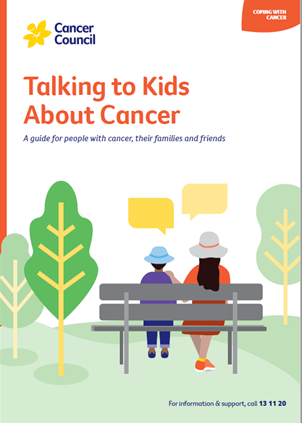- Home
- About Cancer
- Family and friends
- Talking to kids about cancer
- Living with advanced cancer
- How children understand death
How children understand death
In preparing children for the loss of a parent or another significant person, it’s helpful to understand how death is perceived at different ages. Children’s grief may be expressed through their behaviour or how they play.
Learn about the different views of:
Newborns, infants and toddlers (0-3 years)
Babies don’t have any knowledge of death but can sense when their routine is disrupted and when their carers are absent. Toddlers often do not understand that death is permanent.
Possible reactions |
Suggested approaches |
|
|
Preschoolers (3-5 years)
By the preschool years, children are starting to understand the concept of death but struggle with the idea that death is permanent (e.g. they may ask when the dead parent is coming home). Young children don’t have an adult concept of time and understand only what’s happening now.
Possible reactions |
Suggested approaches |
|
|
Primary schoolchildren (5-12 years)
By the primary school years, children may understand death but often don’t have the emotional maturity to deal with it. Younger children may think death is reversible and that they are responsible.
Possible reactions |
Suggested approaches |
|
|
Teenagers (12-18 years)
Teenagers can understand death but may not have the emotional capacity to deal with its impact. They need as much preparation as possible for a parent’s death. Like adults, teenagers’ responses to death vary. Some may be more upset when their parent is unwell than following the death, others become distressed after the death.
Possible reactions |
Suggested approaches |
|
|
→ READ MORE: Family life after treatment
Podcast: Explaining Cancer to Kids
Listen to more episodes from our podcast for people affected by cancer
More resources
Prof Jane Turner AM, International Psycho-Oncology Society President Emeritus,The University of Queensland, QLD; Taylor Baker, Consumer; Dr Ben Britton, Principal Clinical and Health Psychologist, Head of Psychology, Hunter New England Mental Health, NSW; Camp Quality; Dr Lisa Cuddeford, Head of Department, WA Paediatric Palliative Care Service, Perth Children’s Hospital, WA; A/Prof Peter Downie, Head, Paediatric Haematology–Oncology and Director, Children’s Cancer Centre, Monash Children’s Hospital, VIC; Dr Sarah Ellis, Clinical Psychologist, Kids Cancer Centre, Sydney Children’s Hospital, NSW; Malia Emberson-Lafoa’i, Consumer; Kate Fernandez, 13 11 20 Consultant, Cancer Council SA; Jane Gillard, Consumer; Mary McGowan OAM, International Childhood Cancer Advocate, VIC; Annette Polizois, Senior Social Worker, Women, Family and Emergency Care Team, Royal North Shore Hospital, NSW; Rhondda Rytmeister, Clinical Psychologist, HeadWayHealth (formerly Snr Clinical Psychologist, The Cancer Centre for Children, Westmead, NSW); Nadine Street, Head of Social Work and Social Welfare, HNE Mental Health Service, NSW; Warren Summers, Online Counsellor, Canteen, NSW.
We would also like to thank the health professionals, consumers, organisations and editorial teams who have worked on previous editions of this title, and we are grateful to the parents and young people whose real-life stories have added to the richness and relevance of this book.
We thank and acknowledge Dr Paula K. Rauch, MD, Founder and Director, Marjorie E. Korff PACT (Parenting At a Challenging Time) Program and Associate Professor of Psychiatry, Harvard Medical School, whose research and writing on helping parents talk to their children about cancer was used as source material for this book and has been adapted in several sections: pages 8–11, How children understand cancer; page 22, Answering key questions: Are you going to die?; page 26, Involving the school or preschool; pages 30–31, Hospital visits; and pages 36–37, Encouraging family time. We also thank the American Cancer Society for permission to use and adapt material on pages 8-11 from its book Cancer in Our Family: Helping children cope with a parent’s illness (2013); Macmillan Cancer Support for permission to use its book Talking to Children and Teenagers When an Adult Has Cancer (2013) as a source of information; Jessica Watt, Oncology Social Worker, The Children’s Hospital at Westmead, for her contribution on page 20, When another child has cancer; and Diane McGeachy, Hobart Counselling Centre, for contributing material for page 37, Spending one-on-one time.
View the Cancer Council NSW editorial policy.
View all publications or call 13 11 20 for free printed copies.

